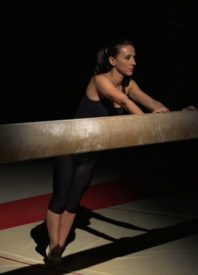
Adrian Robe and Denisa Morariu-Tamas’ The Golden Girl explores the life of former gymnast Andreea Raducan. There are two timelines here. The first timeline has her recounting her time under the Romanian gymnastics program. Here, she opens up about how that program starved its young athletes. The second, and the film’s main focus, is her navigation of the International Olympic Committee’s bureaucracy. During the 2000 Sydney Olympics, she was the all around gymnastics champion, winning the gold for her country. Winning also meant that the IOC tested her for doping. Erroneous tests resulted in the IOC taking away her medal.
Fifteen years later, she wants that medal back. Raducan isn’t The Golden Girl‘s only subject. It also talks to her rivals like Russian Svetlana Khorkina, who discusses her place in history alongside Raducan. Khorkina makes an indelible mark in a film. Both women have differing historical perspectives, speaking to that concept that’s as malleable as their young bodies were. The Golden Girl also paints her as an entertaining person. Khorkhina is bitter in her loss against Raducan. The film portrays her interview as if she needs to sit on a chair which is delightfully messy. She waves to the camera with the new Russian gymnasts who she hopes will beat Romania because she couldn’t. Raducan has to deal with her own loss her way. The film captures these women’s competitiveness as well as the sisterhood that comes with the pain they share.
The film also contrasts Raducan against the Olympic Committee. She looks great in scenes capturing her diplomatic skirmishes against the committee. This speaks to how people like her have to be on their best behavior. They have to follow respectability politics even if they’re on the moral right. This contrasts the angry activism of today, although both are valid tactics. There’s also a clarity and a delicate balance in depicting the committee. One that, at first, only exists through phone calls with anonymous committee members, disguising their voices for political reasons. The member suggests that she write a letter to the committee’s new president, Thomas Bach. This leads to an intimate meeting that goes public, and that publicity might get her her win back.
The Golden Girl touches on sports, its bureaucracy, and its history, but Raducan has a life outside of those things. It eventually depicts her wedding. It generally shows how normal she is despite having a committee wrong her. Despite having a bad psychiatrist explain her trauma to her. A simple film like this proves that there’s a magic in documentary film making. She’s the tallest person in any room despite being less than five feet tall. Scenes like her wedding also show Romanian culture. Seeing that culture, even in slivers, show that she’s fighting more than a personal victory. Nationalism feels archaic but her fight makes audience believe it. And she’s not alone. Also making an appearance here is Nadia Comaneci who, despite living in Oklahoma, fights alongside her countrywoman.
Watch The Golden Girl on iTunes and Vimeo.
- Release Date: 9/2/2020

